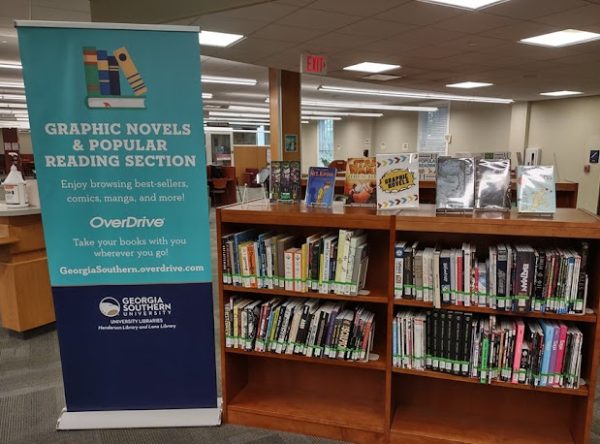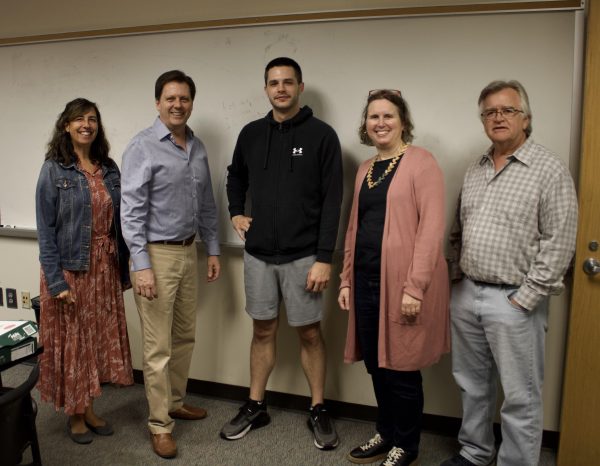OP-ED: “When Will I Ever Use This?”
Course Descriptions Don’t Provide Useful Information for Students
A college student is confused by her class notes taken by CollegeDegrees360, licensed under Creative Commons license 2.0
After four years of registering for classes at Georgia Southern as a Writing and Linguistics major and a Public Health minor, I realize that the person who wrote the course descriptions forgot that universities operate like businesses that need to retain consumer buy-in to function.
Most course descriptions talk about what students will discuss and the best practices and theories students will learn instead of answering students’ question: “What marketable skills will I learn from this course that will help me in later course work or in my career?” As a student, those theories don’t help me care about what I’m learning, want to put extra effort into the course or answer the student’s favorite question, “When will I ever use this?”
I decide how much effort I put into each class, which affects my GPA, my graduation date, and my job prospects after graduation.
The admissions office tracks graduation dates and job prospects of students and alumni and shows them to potential students. Those statistics affect how many new students the university has. How many new students the university has affects how much money the university has.
The course description Writing for Social Media says, “Introduction to emerging theory and practices relevant to social media.” Yet, students learn for the first time in this course the social media practices businesses use social media to market to and engage with their current and potential customers. Students will use the conversations on branding, community engagement, search engine optimization (SEO) and social media optimization (SMO) in their internships and future careers.
The course description for Epidemiology and Biostatics barely mentions the new information students will learn in the class: the statistics.
It says, “This course introduces the student to the principles and practice of epidemiology and biostatistics. Students will be exposed to the historical development of epidemiology, concepts of causality, definitions of health and disease, and sources of community health data. Current principles and practices in the cause, prevention and control of diseases in various community settings will be emphasized.” The course description should say, “Students will learn how to calculate and interpret rates, ratios, proportions and other epidemiological statistics that they will use in their careers.”
The course descriptions for Composition I and Composition II miss an opportunity to tell students why they need to learn the skills they learn in those courses.
The answer: Students need advanced research methods, critical thinking skills and persuasive writing for their future courses and careers. Even if someone is going into information technology or medicine, they will need the communication skills that composition skills that students learn in those composition courses.
Yet, the course description for ENGL 1102 says “This course develops students’ knowledge of writing beyond the proficiency required by ENGL 1101, emphasizing interpreting, evaluating, and synthesizing information to create arguments from a variety of sources using more advanced research methods. Some sections may have specific course themes.”
Rather the ENGL 1102 course description should say: “This course develops students’ knowledge of writing beyond the proficiency required by ENGL 1101, emphasizing the professional writing skills students need of interpreting, evaluating and synthesizing information to create arguments from a variety of sources using more advanced research methods.”
I’m not saying universities should let the opinions of students just out of their teenage years decide what professors emphasize in class. However, universities should explain why their decisions are in the best interests of the students.
Course descriptions should answer questions such as
- “When will I ever use this?”
- “Why should I care?”
- “Why should I put any effort into this course if I won’t need it later?”
The university may control what courses they require us to take to complete our degrees, so yes, I may have to take that class to finish my degree, but no, I don’t need to finish my degree, and no, I don’t have to do it at a specific institution.
If the course descriptions described more clearly why students should care about what they are learning and how they will use those skills in the future maybe more students would care and put more effort into their course work, graduate with better grades, get better jobs and reflect better on the university when they try to recruit new students.
















